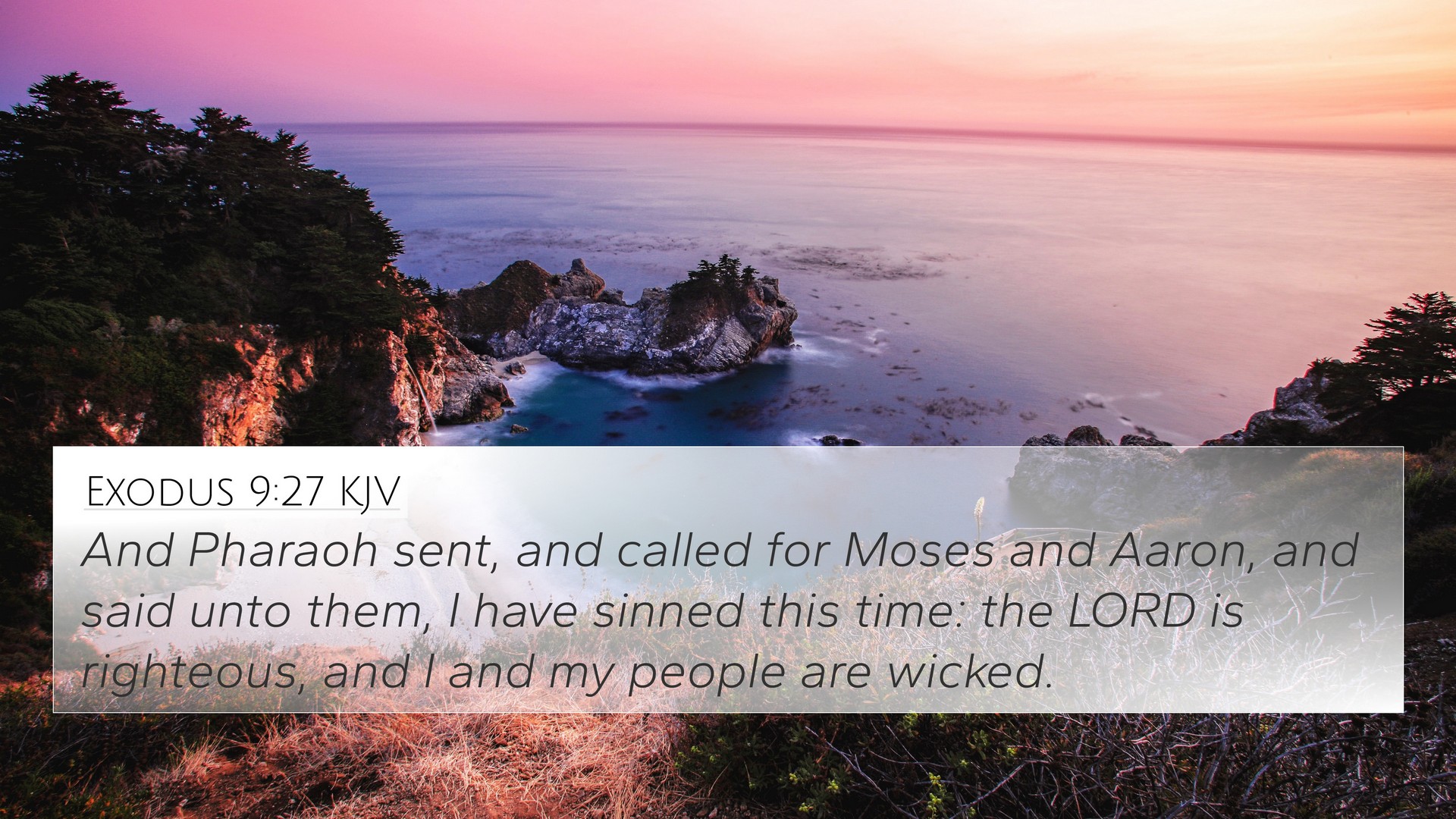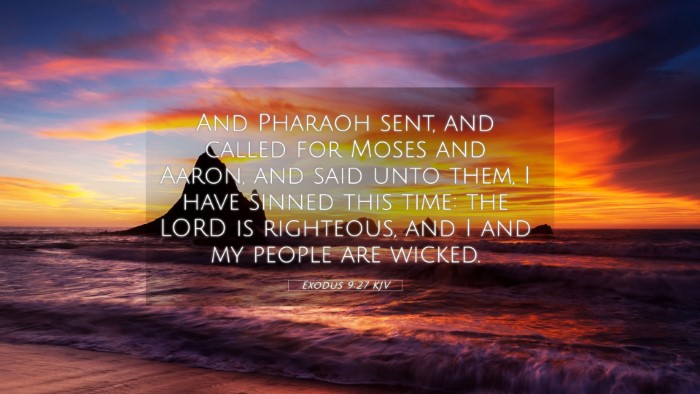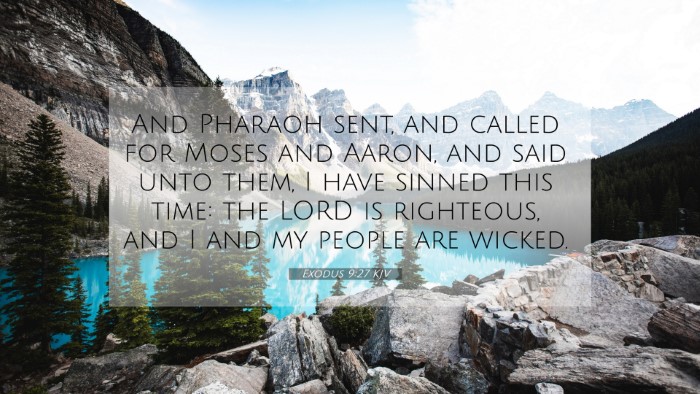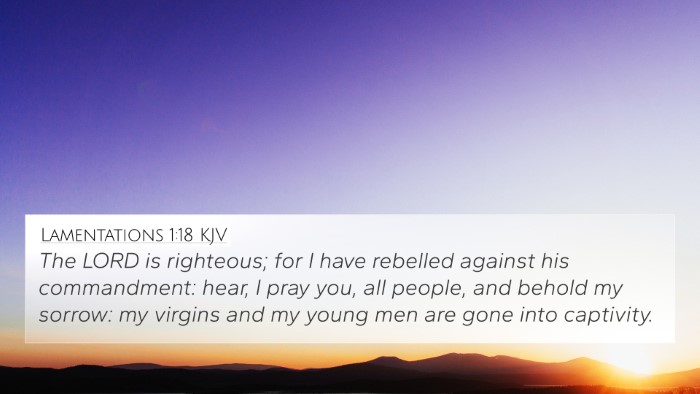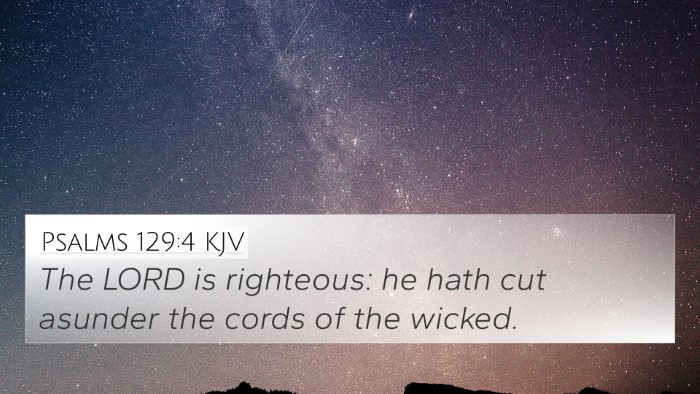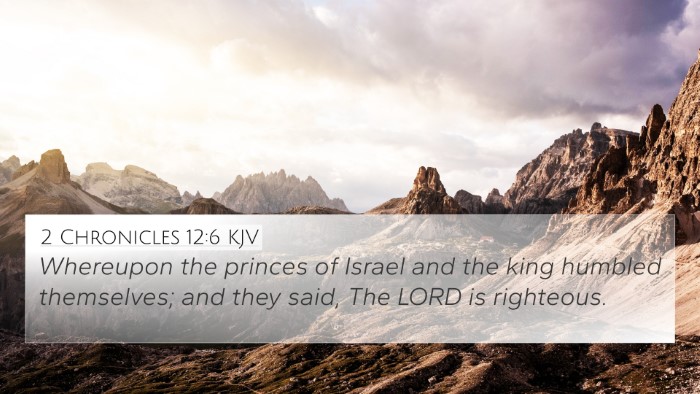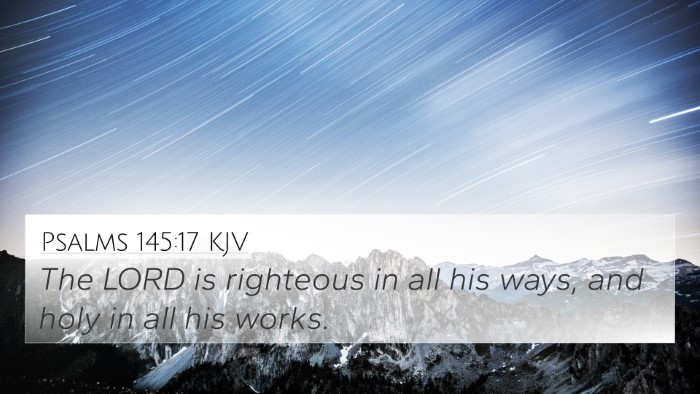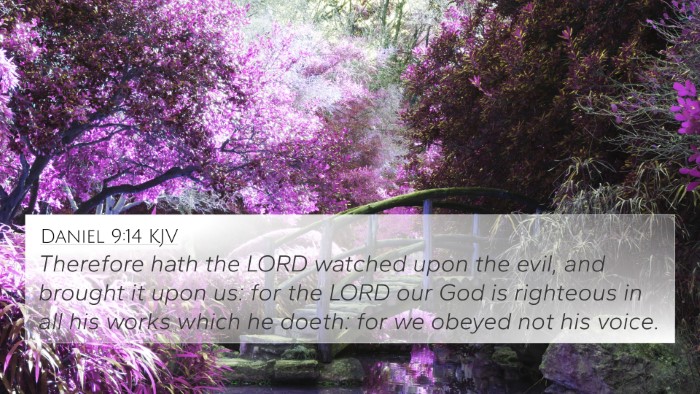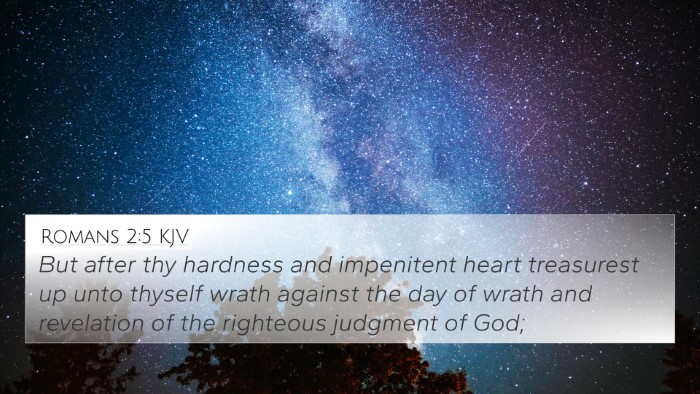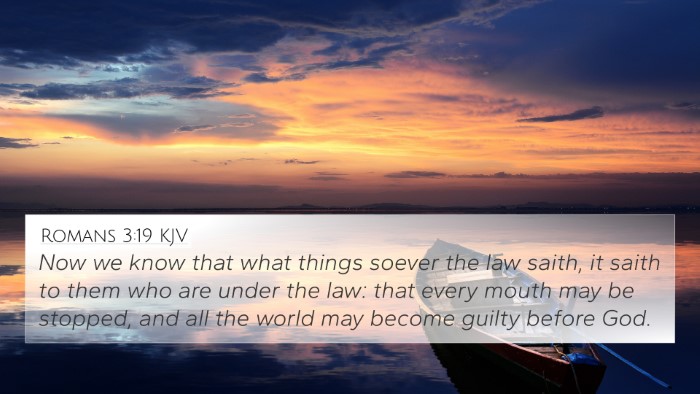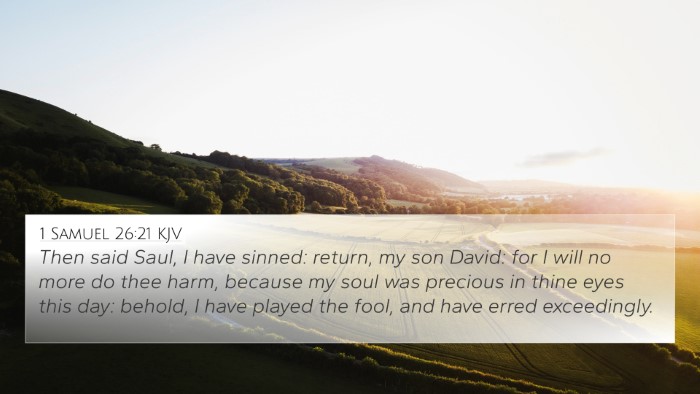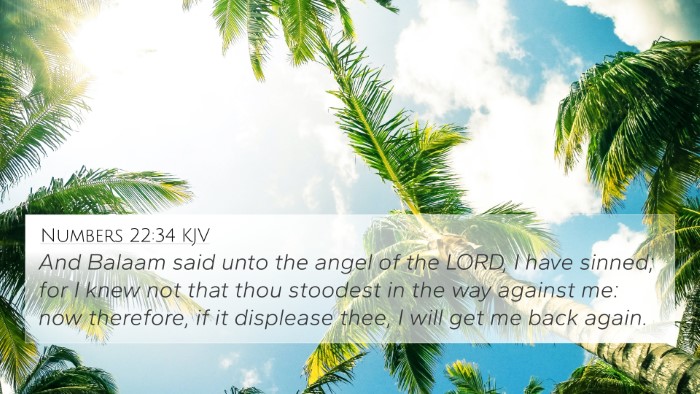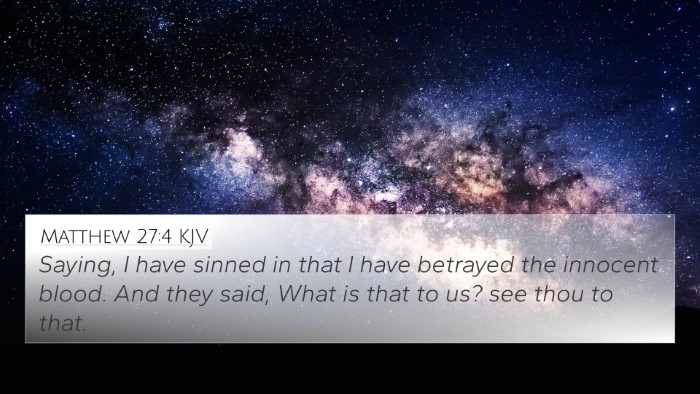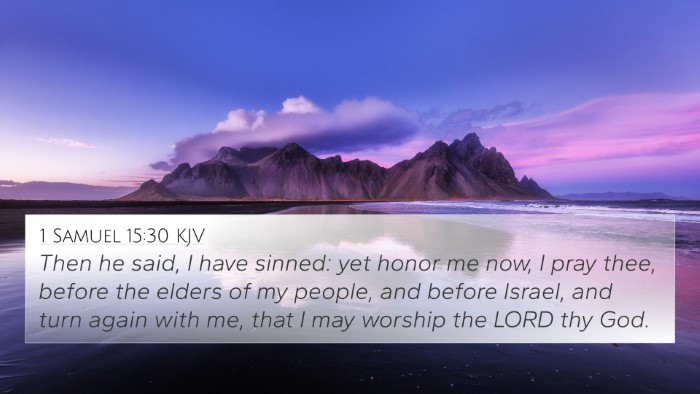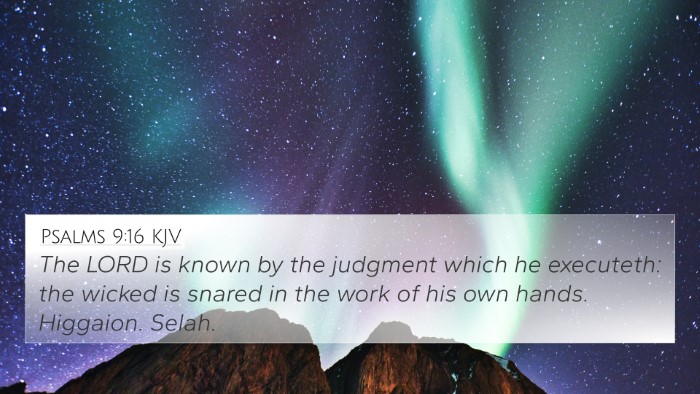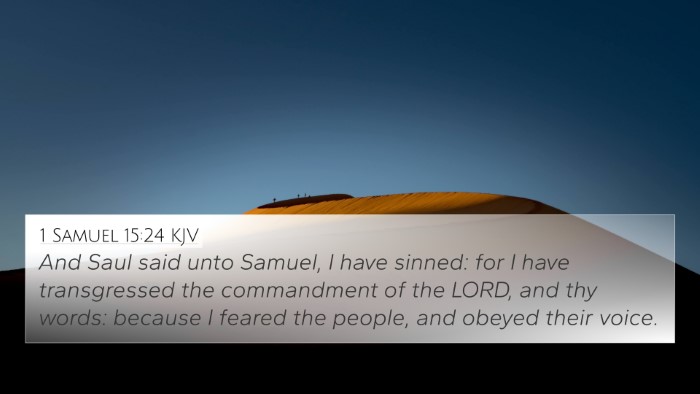Understanding Exodus 9:27
Exodus 9:27 states: “And Pharaoh sent, and called for Moses and Aaron, and said unto them, I have sinned this time: the LORD is righteous, and I and my people are wicked.” This verse comes at a pivotal moment in the narrative of the Exodus, illustrating Pharaoh's response to the plagues that befell Egypt due to his refusal to let the Israelites go.
Summary of Context and Meaning
This verse is part of the account of the seventh plague, the plague of hail, which resulted in significant destruction in Egypt. Pharaoh's acknowledgment of sin reflects a moment of contrition, though it is brief and does not lead to a lasting change of heart.
Insights from Commentators
-
Matthew Henry:
Henry notes that Pharaoh's admission of guilt serves as a recognition of God's righteousness. It reveals the tension between Pharaoh's pride and the undeniable power of God. Despite his temporary change in attitude, Henry suggests that Pharaoh's heart remains hardened, which foreshadows further disobedience.
-
Albert Barnes:
Barnes emphasizes the significance of Pharaoh's words. He indicates that Pharaoh, recognizing the divine hand in the plagues, tries to shift accountability away from himself. This moment illustrates the struggle between human pride and divine authority.
-
Adam Clarke:
Clarke elaborates on Pharaoh's declaration, pointing out that it reveals his internal conflict. While he admits his wrongdoing and acknowledges God's righteousness, Clarke argues that such recognition is flawed if it does not lead to genuine repentance and action.
Connections between Bible Verses
Exodus 9:27 has several related verses that enhance its understanding through context and themes:
- Exodus 5:1: "And afterward Moses and Aaron went in, and told Pharaoh, Thus saith the LORD God of Israel, Let my people go, that they may hold a feast unto me in the wilderness." This verse sets the stage for the confrontation between divine command and Pharaoh's stubbornness.
- Exodus 10:16: "Then Pharaoh called for Moses and Aaron in haste; and he said, I have sinned against the LORD your God, and against you." This highlights Pharaoh’s recurring pattern of temporary repentance.
- Romans 9:17: "For the scripture saith unto Pharaoh, Even for this same purpose have I raised thee up, that I might show my power in thee, and that my name might be declared throughout all the earth." This verse ties Pharaoh’s plight back to God’s sovereignty and purpose.
- 2 Thessalonians 2:11-12: "And for this cause God shall send them strong delusion, that they should believe a lie: That they all might be damned who believed not the truth, but had pleasure in unrighteousness." This reflects the theme of God’s sovereignty in the midst of human rebellion.
- Proverbs 28:13: "He that covereth his sins shall not prosper: but whoso confesseth and forsaketh them shall have mercy." This serves as a reminder about the necessity of genuine repentance.
- Hebrews 3:15: "While it is said, To day if ye will hear his voice, harden not your hearts, as in the provocation." This verse echoes the warning against hardening one's heart in the face of divine revelation.
- Job 33:27-28: "He looketh upon men, and if any say, I have sinned, and perverted that which was right, and it profited me not; He will deliver his soul from going into the pit, and his life shall see the light." This illustrates the connection between confession of sin and divine deliverance.
Thematic Bible Verse Connections
The themes presented in Exodus 9:27 resonate with various biblical principles, such as repentance, acknowledgment of wrongdoing, and the struggle between pride and humility before God. These themes are explored throughout Scripture, illustrating a consistent message about the nature of sin and redemption.
Cross-Referencing Biblical Texts
When exploring the connections between Bible verses, tools for cross-referencing, such as a Bible concordance or a Bible cross-reference guide, can enhance understanding. These tools facilitate a comprehensive study, allowing for the examination of similar themes and recurring motifs within the biblical narrative.
Using Bible Cross-References Effectively
To effectively use cross-references in Bible study, one can:
- Identify key themes within a verse and search for related scripture.
- Utilize a bible reference resource to explore thematic connections.
- Engage in comparative Bible verse analysis to discern deeper meanings.
- Incorporate cross-referencing in sermon preparation to enrich teaching.
Conclusion
Exodus 9:27 serves as a poignant example of the human condition when faced with divine authority. The complexity of Pharaoh's character, coupled with the biblical themes of repentance and acknowledgment of sin, elicits profound reflections applicable across both the Old and New Testaments. It stands as a testament to the importance of cross-referencing biblical texts for deeper understanding and insight into God's word.
